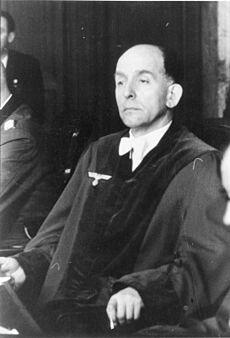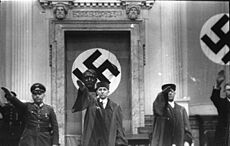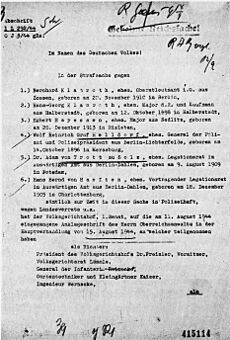Roland Freisler facts for kids
Quick facts for kids
Roland Freisler
|
|
|---|---|
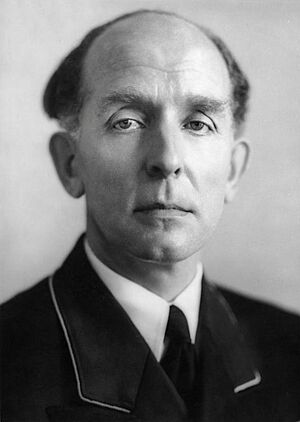
Freisler in 1942
|
|
| Judge President of the People's Court | |
| In office 20 August 1942 – 3 February 1945 |
|
| Chancellor | Adolf Hitler |
| Preceded by | Otto Thierack |
| Succeeded by | Wilhelm Crohne (acting) Harry Haffner |
| State Secretary Reich Ministry of Justice |
|
| In office 1 April 1935 – 20 August 1942 |
|
| Minister | Franz Gürtner |
| Preceded by | Position created |
| Succeeded by | Curt Rothenberger |
| Additional positions | |
| 1933–1935 | State Secretary, Prussian Justice Ministry |
| 1933–1945 | Prussian State Council |
| 1933–1945 | Reichstag |
| Personal details | |
| Born | 30 October 1893 Celle, Hanover Province, Kingdom of Prussia, German Empire |
| Died | 3 February 1945 (aged 51) Berlin, Free State of Prussia, Nazi Germany |
| Resting place | Waldfriedhof Dahlem, Berlin, Germany |
| Political party | Nazi Party |
| Other political affiliations |
Völkisch-Social Bloc |
| Spouse |
Marion Russegger
(m. 1928) |
| Relations | Oswald Freisler (brother) |
| Children | 2 |
| Alma mater | University of Jena |
| Profession | Judge, lawyer |
| Civilian awards | Golden Party Badge |
| Military service | |
| Allegiance | |
| Branch/service | Prussian Army |
| Years of service | 1914–1918 |
| Rank | Leutnant |
| Unit | 167th Infantry Regiment (1st Upper Alsatian) 22nd Division |
| Battles/wars | World War I |
| Military awards | Iron Cross, 2nd class |
Karl Roland Freisler (born October 30, 1893 – died February 3, 1945) was a German lawyer and judge. He was a key figure in the Nazi Party and helped change Germany's legal system to fit Nazi ideas. From 1942 to 1945, he was the head judge of the People's Court. This court handled political crimes. Freisler was known for being very harsh, often yelling at people on trial, and giving out many death sentences. He also attended the 1942 Wannsee Conference, which was a meeting about the Holocaust.
Contents
Early Life and Education
Roland Freisler was born in Celle, Germany, on October 30, 1893. His father, Julius Freisler, was an engineer and teacher. Roland had two brothers, one of whom, Oswald Freisler, also became a lawyer. Roland did very well in school, graduating at the top of his class in 1912.
He began studying law at Kiel University. However, his studies were stopped when World War I started.
World War I Experience
In 1914, Freisler joined the German Imperial Army as an officer cadet. He fought on the front lines and was awarded the Iron Cross for bravery. In October 1915, he was hurt and captured by Russian forces.
While a prisoner, Freisler learned to speak Russian. He also became interested in Marxism after the Russian Revolution. He even helped organize food supplies in his prisoner camp. Later, when he joined the Nazi Party, rumors about his time with the "Reds" (Soviets) followed him.
Becoming a Nazi Judge
After the war, Freisler finished his law studies and became a doctor of law in 1922. He joined the Nazi Party in July 1925. Because he was a lawyer, he often defended other Nazi Party members who were in trouble with the law. This helped him gain power within the party.
When the Nazis took power in 1933, Freisler quickly rose through the ranks. He became a high-ranking official in the Prussian Ministry of Justice. He used his position to remove Jewish staff members. In 1935, he became the State Secretary in the main German Ministry of Justice.
Changing Laws for the Nazis
Freisler strongly believed in Nazi ideas. He used his legal skills to turn these ideas into actual laws. He wrote papers arguing that young people who were "racially foreign" or "defective" should be separated from "German and racially valuable" youth.
He even looked at racist laws in the United States as examples for new Nazi laws against Jewish people in Germany.
During World War II, Freisler created a law called the "Decree against National Parasites." This law used harsh terms to describe criminals, especially young ones, suggesting they were like "parasites" that needed to be removed.
In 1941, Freisler ordered that Jewish prisoners in German jails had to wear the identifying yellow badge. He also worked with other Nazi officials to make sure that Jewish people and Poles in occupied areas faced very severe punishments, even for small crimes. Often, this meant the death penalty or being sent to a concentration camp.
The Wannsee Conference
On January 20, 1942, Freisler attended the Wannsee Conference. This was a secret meeting of high-ranking Nazi officials near Berlin. The purpose of the meeting was to plan the "Final Solution," which was the Nazi plan to kill all Jewish people in Europe. Freisler was there to give legal advice on this terrible plan.
Leading the People's Court
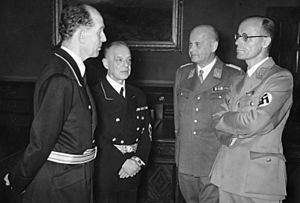
In August 1942, Freisler became the head judge of the People's Court. This court dealt with many political crimes, like black market dealings or anything seen as weakening Germany's war effort. Freisler saw these actions as very serious and punished them harshly.
Under Freisler, the People's Court almost always found people guilty. It became known as a court that simply carried out Nazi orders rather than providing fair trials. It was more like a "revolutionary tribunal" than a real court of law.
Freisler wore a bright red judge's robe in court. The courtroom was decorated with red Nazi flags and a large statue of Adolf Hitler. He would even give the Nazi salute from his judge's seat. He acted as the prosecutor, judge, and jury all at once.
The number of death sentences greatly increased under Freisler. About 90% of all cases he heard ended in a guilty verdict. He gave out as many death sentences in three years as all other judges in the court's entire history combined.
Famous Trials
Freisler was known for yelling at and insulting the people on trial. He had even studied how Soviet prosecutors acted in their "show trials" in Moscow.
White Rose Trials
In February 1943, Sophie Scholl and Hans Scholl, along with Christoph Probst, were caught by the Gestapo. They were part of a resistance group called the White Rose, which spread pamphlets urging people to resist the Nazis. Freisler was specially flown to Munich to oversee their trial. He quickly found them guilty and sentenced all three to death.
He returned in April 1943 for a second trial of other White Rose members. Three more people were sentenced to death, and many others received prison sentences.
20 July Plot Trials
In August 1944, some of the people who tried to assassinate Adolf Hitler in the 20 July Plot were brought before Freisler. Their trials were filmed to be shown to the German public. The films showed Freisler switching between asking questions and then suddenly shouting insults at the accused. Almost everyone on trial was sentenced to death.
Freisler's Death
On February 3, 1945, Freisler was holding a court session when American bombers attacked Berlin. He quickly stopped the trial and told the prisoners to go to an air raid shelter. However, he stayed behind to gather some important files.
A bomb hit the court building. A heavy stone column fell and hit Freisler while he was looking at his documents. He died instantly. One of the files he was holding was for Fabian von Schlabrendorff, a member of the 20 July Plot who was on trial that day. Von Schlabrendorff survived the war and later became a judge himself.
Freisler was buried in his wife's family grave in Berlin, but his name is not on the gravestone.
Personal Life
Roland Freisler married Marion Russegger in 1928. They had two sons named Harald and Roland.
Freisler in Movies and Books
Roland Freisler has appeared in several fictional works and films:
- In the novel Every Man Dies Alone (1947) by Hans Fallada.
- In the novel Fatherland (1992) by Robert Harris.
- He has been played by actors in films like Conspiracy (2001) and Sophie Scholl – The Final Days (2005).
See also
 In Spanish: Roland Freisler para niños
In Spanish: Roland Freisler para niños
- Hanging judge
- Kangaroo court
- Hans Frank
- Harry Haffner
- Robert Rosenthal
- Carl Schmitt
- Günther Vollmer
- Helmuth James Graf von Moltke
 | Charles R. Drew |
 | Benjamin Banneker |
 | Jane C. Wright |
 | Roger Arliner Young |


